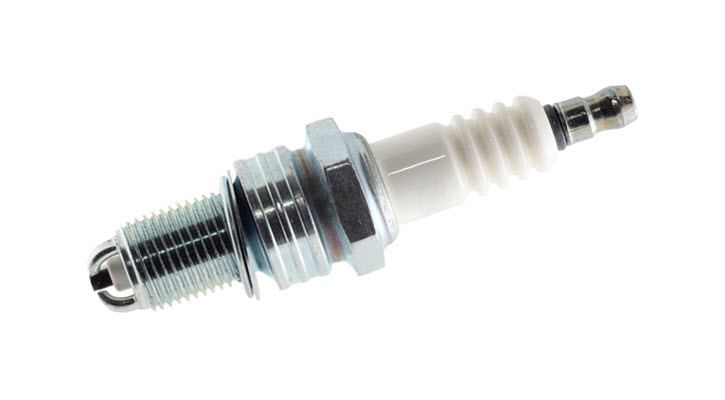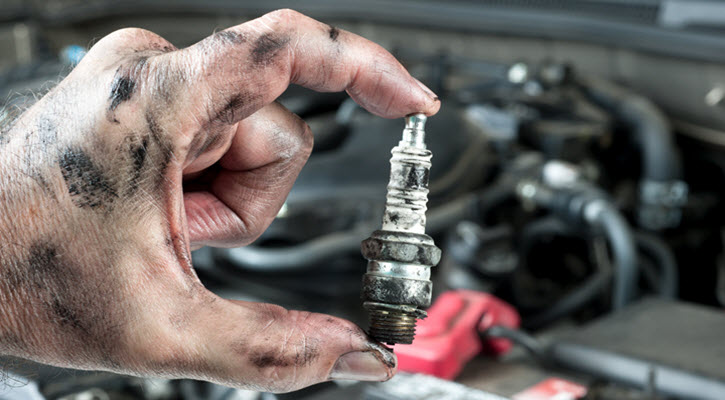
for Audi, BMW, Land Rover, Jaguar, Mercedes,
Mini, Porsche & Volkswagen Repair

for Audi, BMW, Land Rover, Jaguar, Mercedes,
Mini, Porsche & Volkswagen Repair

Failing spark plugs are one of the most common issues that all motorists need to repair. However, many drivers ignore the symptoms caused by this easy-to-fix part, resulting in severe consequences for their vehicles. In this article, we’re going to take a quick look at what you should be on the lookout for when it comes to failing spark plugs and discuss what to do when you run into a spark plug issue.
Spark plugs are in charge of creating an electrical spark to ignite the fuel inside the engine. This spark is high-voltage electricity that travels between two plugs over a short gap. Each time this happens, however, the powerful electricity wears away at the surface of the plugs. Over time, the gap that the spark has to travel increases until this becomes difficult. Because of this, standard spark plugs have a lifespan of 30,000-60,000 miles.
In recent years, spark plugs have started to be coated with special metals like yttrium, platinum, and iridium. This makes the rate of wear far slower, leading to plugs that can last between 60,000-100,000 miles.
Of course, age isn’t the only reason spark plugs fail. There can be connectivity issues or problems with associated systems such as the ignition coil, which may need to be addressed instead.
You can tell if your BMW has developed issues with its spark plugs by being on the lookout for the following signs and symptoms which combined will lead to an overall worsened driving experience, a rough ride, and bad performance.
Ignition misfires are probably the most common symptom experienced by BMW drivers that lead them to check the status of their spark plugs. Ignition misfires occur when the spark generated by the spark plugs isn’t sufficient enough to ignite the fuel in the engine chamber. This results in the overall rough running of your BMW that is most noticeable in the form of rough idling, poor fuel efficiency, and limp acceleration. Frequent or more severe misfires are also likely to trigger the illumination of your check engine light, and if left ignored for a longer period of time, this may even lead to total engine failure.
Also known as the EML or engine management light, the check engine light is controlled by your BMW’s engine control unit or ECU, which is your vehicles main onboard computer. When the ECU discovers an issue that is affecting the performance of you engine, it will illuminate the EML and send fault codes out which your preferred BMW mechanic can translate with an OBDII reader.
Frequent misfires experienced as you drive will result in what is known as rough idling. Rough idling occurs when your engine is running lean, which means when the air and fuel mixture is imbalanced. This imbalance causes your car to judder and vibrate noticeably when idling.
Your engine needs to be working in peak performance in order to provide punchy acceleration. When the spark plugs are letting the team down, acceleration will become tricky which will lead to sluggish and limp feeling acceleration.
The spark plugs are essential for not only keeping your engine running but also helping it start in the first place. Therefore, if your spark plugs are failing, it may take several tries to start your BMW.
In order to get the most out of a tank of gas, your BMW needs to be peak working condition. So, when the spark plugs are unreliable, your engine will need to make up for the shortfall, increasing your rate of fuel consumption.

Getting your BMW fixed in Houston has never been easier with European Service Center on hand to help. With 7 locations throughout Texas and Georgia, you’re never far away from high-quality and reliable auto repair and servicing. Best of all, as we are the experts in European imported cars, your BMW is in the most experienced hands in town!